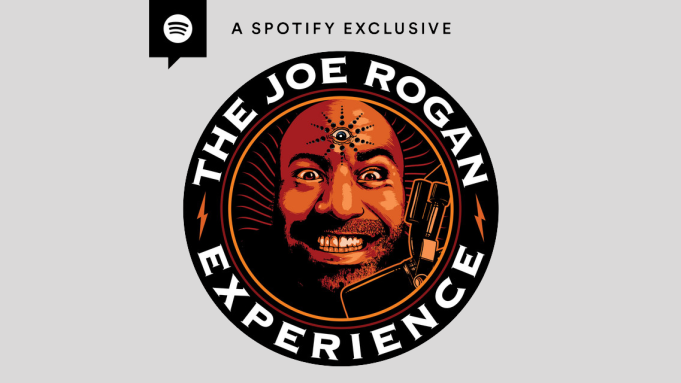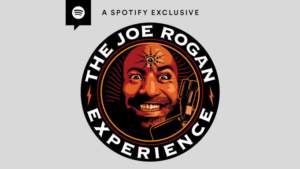Rogan’s Scandal Is Just the Tip of the Podcast Misinformation Iceberg

by Reade Fenner ‘22
Joe Rogan, host of popular Spotify podcast “The Joe Rogan Experience,” recently has come under scrutiny for spreading Covid-19 misinformation. Last April, Rogan promoted the use of Ivermectin, an anti-parasite medication discredited for aiding Covid-19 symptoms by doctors throughout the world. More recently, Rogan welcomed anti-vaccine conspiracist Robert Malone onto an episode in January. Malone, whose medical advice has been widely criticized by the medical community, was banned from Twitter for spreading Covid-19 misinformation. He also discussed conspiracies regarding the inflation of Covid-19 deaths, President Biden lying about receiving the vaccine, and the legalities of vaccine mandates, all of which were proven false.
In response, a group of 270 doctors, science educators, and physicians sent an open letter to Spotify calling for Rogan’s removal from the platform, leading Spotify’s audience to echo this sentiment, citing the platform’s zero-tolerance policy for content “that promotes dangerous false or dangerous deceptive content about Covid-19.” In response, Spotify removed specific episodes of Rogan’s podcast and agreed to put warnings on certain episodes of “The Joe Rogan Experience” that discuss Covid-19, but refused to break off their $200 million exclusivity deal with him, as he brings a massive number of viewers to their platform. Disappointed by Spotify’s minimal action, popular singer-songwriters Neil Young and Joni Mitchell requested their music be removed from the platform.
Though Spotify hasn’t faced a significant viewer drop following Rogan’s scandal, their situation speaks to a larger issue regarding the regulation of misinformation in podcasts.
Misinformation, and how to regulate it without crossing the line into censorship and the restriction of First Amendment rights, has been a prevalent issue for decades. The Federal Communications Commission (FCC) loosely restricts what can be broadcasted on television and radio, banning false information that can “cause direct and actual damage to property or to the health or safety of the general public, or diversion of law enforcement or other public health and safety authorities from their duties.” The FCC attempted to regulate broadcasting companies’ approach to contentious topics in 1949 with the Fairness Doctrine, which required television and radio broadcasters to deliver balanced coverage of significant controversial issues. However, this doctrine was rescinded in 1987 because the FCC found that it had a “chilling effect” on Freedom of Speech rights, leaving radio and television again with few regulations.
Though television and radio are hardly monitored, podcasts are overseen even less. As a sort of a gray area, podcasts are not currently regulated by the FCC or any other government agency, meaning their sole concern is copyright infringement, not monitoring the spread of misinformation.
Publishing titan Simon & Schuster has faced similar challenges with balancing Freedom of Speech with harmful information. In 2017, Simon & Schuster canceled a book deal with controversial conservative author Milo Yiannopoulos after he publicly defended pedophilia, and pulled another deal with Senator Josh Crawley following the January 6 Capitol riots as a result of their morality clause. Most recently, Simon & Schuster severed a deal early last year with an officer involved in the shooting of Breonna Taylor. The actions Simon & Schuster have taken demonstrates that platforms such as Spotify that distribute creators’ work could battle dangers to public safety caused by misinformation on its platform. Spotify chooses not to take that action.
Despite his faults, Rogan does not deserve to be banned from podcasting altogether. However, he is an immensely popular and successful creator with an expansive audience, which comes with a certain level of responsibility. Regardless of Rogan’s rejection of the “journalist” title, he is giving guests a platform to spread misinformation to millions. If Rogan fails to do the proper research himself to fact check such guests, he fails to ensure his viewers receive the accurate information.
Though Rogan personally needs to improve as a podcast host in the public eye, podcasts need to be more heavily regulated to ensure no similar situations arise in the future. Amy Westervelt, host of “Rigged,” a popular podcast that discusses misinformation, has a simple idea for a solution. “The government could very easily say, you know what? Podcasts are going to be under FCC,” said Westervelt in a recent NPR interview. “There’s zero reason that’s in the public interest that I can think of why that hasn’t happened.”
Though Spotify is taking small steps to limit Rogan’s ability to spread misinformation, it is not doing enough; both Spotify and Rogan need to take further action. However, the issue is ultimately larger than just a platform. As long as podcasts remain a gray area of unregulated content, misinformation will continue to spread regarding Covid-19 and other important topics regarding public health and safety.